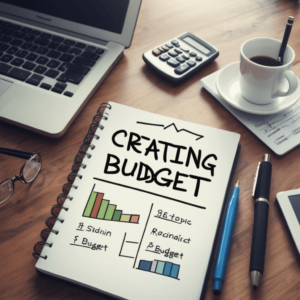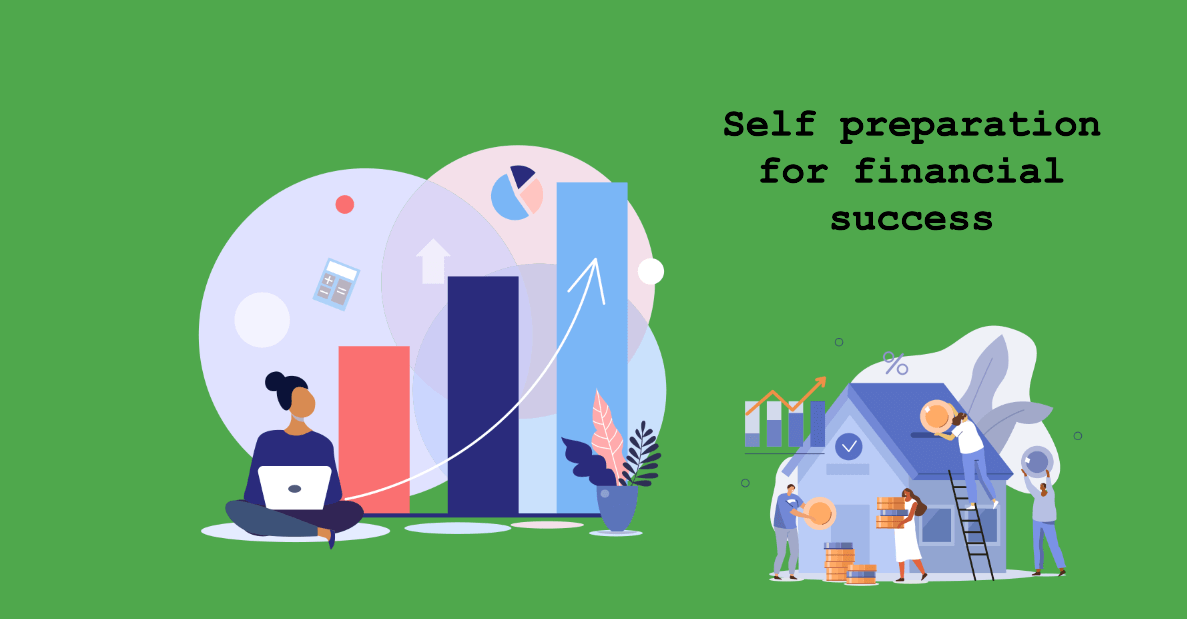Self Preparation for Financial Success
To achieve self preparation for financial success, it is essential to create a detailed budget and stick to it consistently. Another critical step for financial success is investing in a diverse portfolio to ensure long-term growth and stability.
You’re taking the first critical step towards financial success by preparing yourself. Start by clarifying your financial goals, whether it’s buying a home, retiring early, or building a safety net. Identify bad spending habits, such as impulse purchases, and develop a plan to manage your finances efficiently. Create a realistic budget, prioritize your expenses, and allocate your income accordingly. Building an emergency fund, understanding credit and debt, and investing in your financial education are also essential. By doing so, you’ll set yourself up for long-term financial stability and freedom. Now, dig deeper into each of these essential steps to achieve financial success.
Key Takeaways
• Define financial goals and prioritize them to create a roadmap for financial success, ensuring financial decisions align with goals.
• Identify and address bad spending habits, practicing self-reflection and journaling to reduce impulse spending and emotional shopping.
• Build an emergency fund to avoid debt when unexpected expenses arise, aiming to save 3-6 months of living expenses.
• Develop financial literacy by understanding credit scores, debt types, and financial concepts, such as compound interest and diversification.
• Cultivate good financial habits by tracking expenses, creating a budget, and prioritizing needs over wants to achieve long-term financial success.
Identifying Your Financial Goals
To achieve financial success, you must first define what financial success means to you by identifying your financial goals. This is the foundation upon which all other financial decisions are built.
Without clear goals, you risk drifting aimlessly, making financial decisions that may not align with your true aspirations. Dream mapping is a powerful tool to help you clarify your goals. Take time to reflect on what you want to achieve in your life, whether it’s buying a home, retiring early, or simply having a safety net.
Write down your goals and prioritize them. This will help you create a roadmap for your financial journey.
Goal alignment is vital in achieving financial success. When your financial decisions align with your goals, you’ll make progress towards achieving them.
For instance, if your goal is to buy a home, you’ll prioritize saving for a down payment over spending on discretionary items. By aligning your financial decisions with your goals, you’ll make conscious choices that bring you closer to achieving financial success.
Creating a Realistic Budget
With your financial goals in mind, you’re now ready to allocate your income effectively by creating a realistic budget that aligns with your priorities. This essential step will help you manage your finances efficiently and make progress towards achieving your goals.
To create a realistic budget, you’ll need to track your expenses to understand where your money is going. You can use budgeting apps like Mint or Personal Capital to monitor your spending habits and identify areas for improvement.
Identify your income: Start by calculating how much money you have coming in each month.
Categorize your expenses: Divide your expenses into categories, such as housing, transportation, and entertainment.
Set financial priorities: Allocate your income to each category based on your financial goals and priorities.
Regularly review and adjust: Track your expenses regularly and make adjustments to your budget as needed to stay on track.

Breaking Bad Spending Habits
How do you break the cycle of overspending and make conscious financial decisions that align with your goals? Identifying and addressing bad spending habits is essential to achieving financial success. One common pitfall is impulse spending, triggered by emotional responses to stress, boredom, or FOMO (fear of missing out). Another habit to recognize is guilt spending, where you splurge to compensate for feelings of guilt or anxiety.
| Bad Habit | Replacement Strategy |
|---|---|
| Impulse buying | Delay purchases for 24 hours to assess necessity |
| Guilt spending | Practice self-reflection and journaling to address emotional triggers |
| Emotional shopping | Schedule regular self-care activities to reduce stress |
Building Emergency Funds
You’ve worked hard to break free from bad spending habits, and now it’s time to focus on building a safety net to fall back on when unexpected expenses arise.
Having an emergency fund in place can help you avoid going into debt when unexpected expenses pop up. It’s crucial to adopt an emergency mindset, where you prepare for the unexpected and prioritize building a fund that can cover 3-6 months of living expenses.
To allocate your funds effectively, consider the following:
- Set a target amount: Determine how much you need to save based on your income, expenses, and debt obligations.
- Choose the right account: Open a dedicated savings account specifically for your emergency fund to keep it separate from your everyday spending money.
- Automate your savings: Set up automatic transfers from your checking account to your emergency fund to make saving easier and less prone to being neglected.
- Review and adjust: Periodically verify your emergency fund to confirm it’s aligned with your changing financial situation and adjust your contributions accordingly.

Understanding Credit and Debt
As you take control of your financial future, it’s vital to grasp the ins and outs of credit and debt.
You’ll soon discover that your credit score has a significant impact on your financial opportunities, and understanding the different types of debt is vital to making informed decisions.
Credit Score Matters
Your credit score is a three-digit number that can substantially impact your financial well-being, influencing the interest rates you’ll pay, the loans you’ll qualify for, and even the jobs you’ll get. Understanding the factors that affect your credit score and taking steps to maintain a good credit history is vital.
Some key things to keep in mind:
- Check your credit report regularly: Errors on your credit report can negatively impact your score, so reviewing your report regularly and disputing any errors you find is vital.
- Don’t believe credit score myths: Many people believe that checking their credit score will negatively impact it, but that’s a myth. You can check your score as many times as you want without hurting your credit.
- Payment history is key: Your payment history accounts for 35% of your credit score, so making on-time payments is vital.
- Credit utilization matters: Keeping your credit utilization ratio low (ideally below 30%) will help improve your credit score.
Understanding Debt Types
Take control of your finances by recognizing the different types of debt that can impact your credit score and overall financial well-being.
Understanding the various debt types is fundamental for achieving financial literacy and making informed decisions about your money.
You’ll encounter two primary categories: secured and unsecured debt.
Secured debt, like mortgages and car loans, is tied to a specific asset that can be seized if you default.
Unsecured debt, such as credit card balances and personal loans, doesn’t involve collateral.
Differentiating between these types is imperative, as they’ve distinct implications for your credit score and financial stability.
If you’re struggling with multiple debts, debt consolidation might be a viable option.
By consolidating your debts into a single, lower-interest loan or credit product, you can simplify your payments and reduce your debt burden.
Developing a solid grasp of debt types and their implications is a key step in achieving financial literacy and securing a stronger financial future.
Managing Debt Wisely
Now that you’ve categorized your debt into secured and unsecured types, you’ll want to create a plan to manage them wisely, focusing on the debt that’s costing you the most in interest. This will help you make the most progress towards achieving financial freedom.
To manage your debt effectively, consider the following strategies:
- Prioritize high-interest debts: Focus on paying off debts with the highest interest rates first, while still making minimum payments on other debts.
- Consolidate debt: If you have multiple debts with high interest rates, consider debt consolidation into a single loan with a lower interest rate.
- Negotiate with creditors: Reach out to your creditors to see if they can offer any temporary hardship programs or reduced interest rates.
- Cut expenses and increase income: Reduce your expenses and increase your income to free up more money in your budget to put towards your debt.
Investing in Your Education
As you work towards financial success, investing in your education is a vital step.
You’ll need to build a strong foundation of knowledge in personal finance, which will serve as a basis for making informed decisions about your money.
Building Foundational Knowledge
By investing time and resources in your education, you set yourself up for long-term financial success by acquiring the foundational knowledge necessary to make informed decisions about your money.
Building foundational knowledge is essential for achieving financial literacy, which is vital for making smart financial decisions. It’s about developing a money mindset that allows you to take control of your finances and make intentional choices about how you earn, save, and invest your money.
Some key areas to focus on when building your foundational knowledge include:
- Understanding financial concepts such as compound interest, diversification, and risk management
- Learning about different investment options, such as stocks, bonds, and real estate
- Developing a solid understanding of personal finance, including budgeting, saving, and debt management
- Familiarizing yourself with financial tools and resources, such as financial apps, credit reports, and investment platforms
Staying Up-to-Date
You’ve acquired a solid foundation in personal finance, but financial knowledge isn’t a one-time achievement – it’s an ongoing process that requires continuous learning to stay ahead of the curve.
As you navigate the ever-changing landscape of personal finance, staying current is crucial to make informed decisions, adapt to shifting market conditions, and capitalize on emerging opportunities.
To stay current, you can attend seminars, workshops, and conferences, or participate in online forums and webinars.
You can also subscribe to reputable financial publications, podcasts, and blogs to stay informed about the latest developments.
Developing Good Financial Habits
Developing good financial habits requires a deliberate effort to adopt consistent behaviors that promote financial wellness, and it starts with recognizing the importance of making conscious financial decisions.
You must be intentional about creating habits that support your financial goals. This involves cultivating financial discipline, which is essential for achieving long-term financial success.
To develop good financial habits, consider the following:
Track your expenses: Keeping track of your income and expenses helps you identify areas where you can cut back and make adjustments to allocate your resources more effectively.
Create a budget: A budget is a powerful tool for managing your finances and achieving your financial goals.
Prioritize needs over wants: Be honest with yourself about what you need versus what you want, and make conscious decisions to prioritize your financial goals.
Start small: Don’t try to change everything at once; start with small, achievable goals and build from there.
Avoiding Lifestyle Inflation
As you work to develop good financial habits, it’s equally important to avoid falling prey to lifestyle inflation, which can quickly erode the progress you’ve made.
Lifestyle inflation occurs when you increase your spending habits as your income rises, often leading to a false sense of wealth. This can lead to wealth traps, where you’re stuck in a cycle of overspending and debt.
To avoid this trap, you must cultivate a frugal mindset, even as your income grows.
This means continuing to prioritize needs over wants and being mindful of unnecessary expenses. Ask yourself, ‘Will this purchase truly add value to my life?’ or ‘Can I afford to splurge without compromising my financial goals?’
By adopting a frugal mindset, you’ll be better equipped to resist the temptation of lifestyle inflation and stay focused on your long-term financial objectives.
Frequently Asked Questions Self Preparation For Financial Success
How Do I Prioritize Needs Versus Wants in My Spending?
When prioritizing needs versus wants, you’ll create a realistic budget by distinguishing necessities from discretionary spending, exercising financial discipline, and employing budgeting strategies like the 50/30/20 rule to allocate your income wisely.
Can I Still Have Fun While Being Financially Responsible?
You can still have fun while being financially responsible by embracing frugal indulgence, allowing yourself guilt-free guilty pleasures in moderation, and prioritizing experiences over material possessions to strike a balance between enjoyment and responsibility.
Is It Possible to Recover From a History of Bad Financial Decisions?
You can achieve financial redemption by acknowledging past mistakes, creating a debt overhaul plan, and committing to a fresh start. By doing so, you’ll regain control of your finances and pave the way for a more stable future.
How Do I Balance Saving for Retirement and Paying off Debt?
You’ll need to strike a balance between saving for retirement and paying off debt. Create a Retirement Timeline, then prioritize debt repayment using Debt Snowflaking, tackling high-interest debts first to free up more money for retirement savings.
Are There Any Legitimate Ways to Make Extra Money Quickly?
You can make extra money quickly by tapping into the gig economy and online freelancing platforms, offering services like writing, designing, or consulting, which can help you earn a side income quickly and efficiently.
Conclusion
You’ve taken the first step towards financial success by acknowledging the importance of self-preparation. Self preparation for financial success involves mastering budgeting and investing wisely to secure long-term financial stability and growth. By developing disciplined saving habits and acquiring financial literacy, individuals can effectively navigate economic challenges and capitalize on opportunities.
By setting realistic goals, breaking bad habits, and building emergency funds, you’re well on your way to achieving financial stability.
Remember to continuously educate yourself, develop good habits, and avoid lifestyle inflation.
Stay committed to your goals, and with time, discipline, and patience, you’ll reap the rewards of financial success.
I (Susanna) was inspired to start “Best Way to Make Money Online” by my passion for entrepreneurship and my desire to provide practical advice and strategies for individuals seeking financial success in the digital realm. I believe in the power of collaboration and sharing ideas, emphasizing the importance of knowing one’s purpose beyond just profit. My background in language learning and online education has equipped me with the skills and knowledge to create a platform that empowers others to navigate the online landscape effectively and achieve their financial goals.

